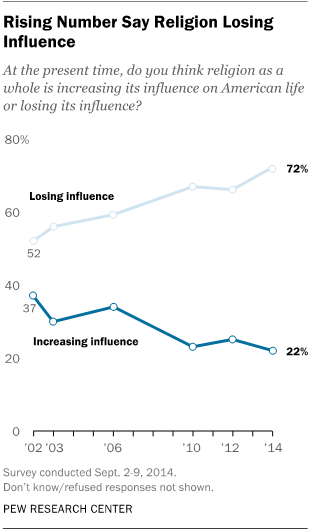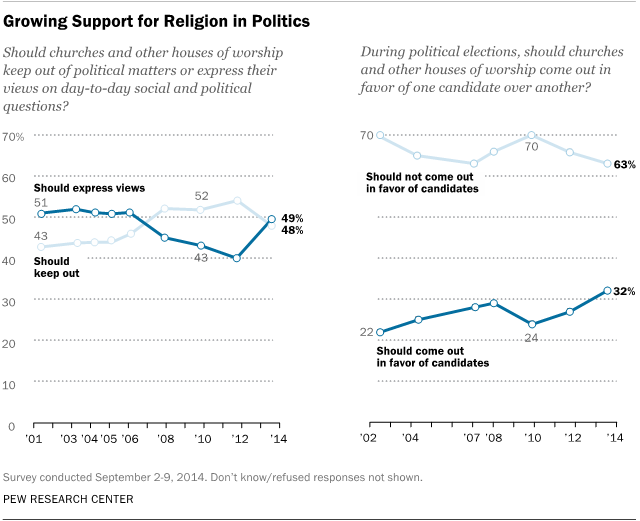Every once in a while a poll comes along that surprises you, and the Pew polls have done that once again. It turns out that a growing number of Americans are not happy with a trend they see against religion in politics.
Nearly three-quarters of the public (72%) now thinks religion is losing influence in American life, up 5 percentage points from 2010 to the highest level in Pew Research polling over the past decade. And most people who say religion’s influence is waning see this as a bad thing.
Perhaps as a consequence, a growing share of the American public wants religion to play a role in U.S. politics. The share of Americans who say churches and other houses of worship should express their views on social and political issues is up 6 points since the 2010 midterm elections (from 43% to 49%). The share who say there has been “too little” expression of religious faith and prayer from political leaders is up modestly over the same period (from 37% to 41%). And a growing minority of Americans (32%) think churches should endorse candidates for political office, though most continue to oppose such direct involvement by churches in electoral politics.
From a Mormon perspective, there is good and bad news in such polls. As a minority religion, Mormons are not necessarily going to be well-treated by “more religion in politics.” On the other hand, Mormons generally seem to favor the Judeo-Christian values of the other dominant religions in the United States, so most Mormons probably look favorably on such trends.
I would encourage readers to peruse the entire poll, which can be found here.
One trend I found interesting is the increasing separation between the religious and non-religious. As Pew states it:
The findings reflect a widening divide between religiously affiliated Americans and the rising share of the population that is not affiliated with any religion (sometimes called the “nones”). The public’s appetite for religious influence in politics is increasing in part because those who continue to identify with a religion (e.g., Protestants, Catholics and others) have become significantly more supportive of churches and other houses of worship speaking out about political issues and political leaders talking more often about religion. The “nones” are much more likely to oppose the intermingling of religion and politics.
So on the one hand we have an increasing number of people rejecting religion. And on the other we have religious people becoming more vocal about sustaining religious discussions in the public square. I find that very interesting.
Please read the poll and share your thoughts below.




New Post: Poll: growing appetite for religion in politics: Every once in a while a poll comes al… http://t.co/P6Oejr6Xly #LDS #Mormon
TheMillennialStar: Poll: growing appetite for religion in politics http://t.co/bymeQ7jhiI #lds #mormon
The most important news from this poll is the divide between the religious and non-religious. That divide continues to grow and with it, a less civil society results as the two “sides” struggle to get along.
To the degree that practice follows profession, I’m inclined to view this as a mostly good thing. My oldest son served a Spanish-speaking mission and the Catholic Church was the bane of his existence. I wrote him a number of e-mails that talked him back from the brink and hopefully helped him gain a greater understanding of the Lord’s work and kingdom. Given the number of legal hassles the Catholic Church has faced through unjust legal oppression, I told him that while I won’t spend a cent to help the Catholics proselyte, if they need money in a legal defense fund, I’m in. If the Catholics are rolled, the rest of us are doomed. I also mentioned to him that the Lord’s wisdom is capable of dealing with any who are living their own religion to the best of their ability and He will make good. It is my opinion that in the coming days, many Latter-day Saints will find themselves standing shoulder-to-shoulder with Baptists, Catholics, Jews and others, defending our liberties from the more Progressive members of our own faiths.
Like many current political issues, the separation of church and state is a red herring that was largely started by Justice Hugo Black and mostly finished by Lyndon Johnson. LBJ had at least one preacher who despised him and actively used the pulpit to seek Johnson’s defeat. The Johnson Amendment of 1954 altered the tax code to prohibit tax-exempt organizations from endorsing or opposing political candidates. Since that time, the Left’s interpretation of the Amendment has grown to include sharing an opinion in church on any political matter.
This is another one of those areas that the political left tends to ignore regularly when it’s convenient for them to electioneer from the pulpit. We have a fairly liberal member of the stake high council and I’ve butted heads with him on a number of occasions. He’s fairly intelligent, but where he’s wrong doctrinally, he tends to cork-screw into the ground at Mach 2 and refuses to accept scriptural recitations showing the correct doctrine. A short while back, we had a problem at our building and had to attend with a nearby ward. I was sitting in the back of the building and in fairness to him, wasn’t paying much attention to his sermon on the Good Samaritan. About halfway through, he suddenly asserted in a loud voice, “There are no forty-seven percenters in the gospel.” I perked up at this and initially thought, “Yeah, you’re right. Members of the church can’t vote themselves church welfare funds out of my back pocket.” I was initially inclined to let it go, but a couple of minutes later he repeated the line and launched into one of his frequent diatribes. At that point, I stood up from where I was sitting and walked out with my youngest son.
PantherII, I think you raise the primary problem with mixing religion and politics, and that is the activists on all sides who want to turn religious meetings into political meetings. Nothing good can come from this in terms of creating a spiritual environment free from contention. Just as you walked out on your liberal high council member, there are liberals (or libertarians) in the pews who feel offended by people endorsing Mitt Romney form the pulpit. I can’t see any way that you can mix politics from the pulpit with the pure Spirit of Christ.
So I think the Church’s position has been the best one, which is to simply push broad moral issues without getting involved in individual political candidates.